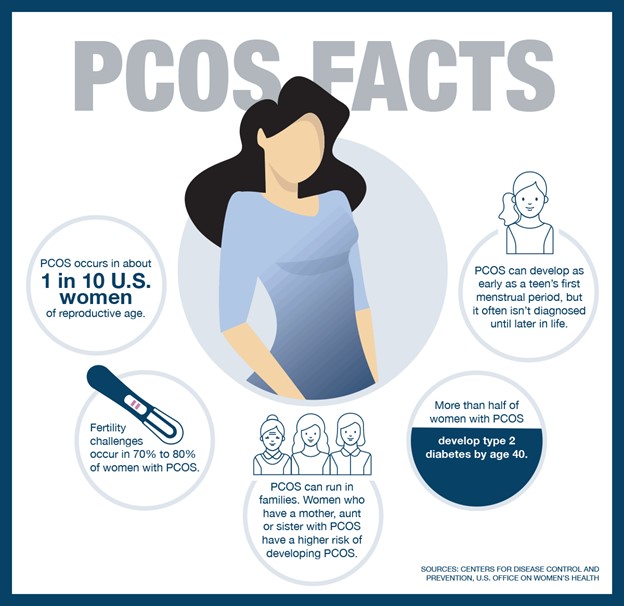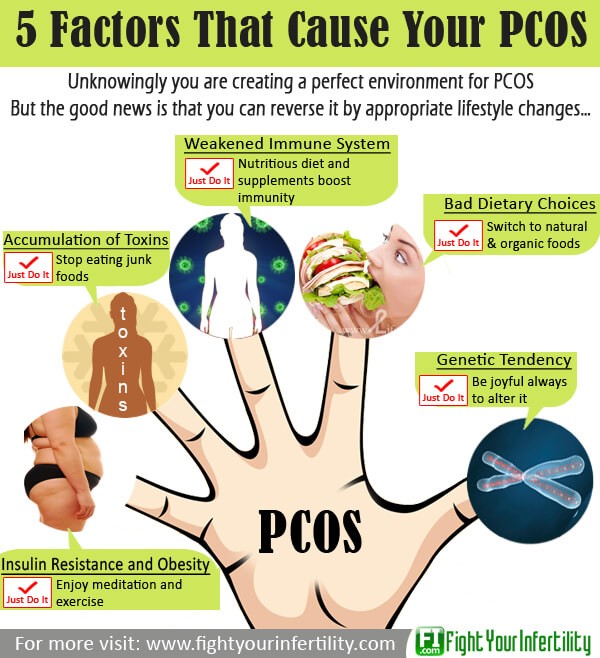Overview
Polycystic ovary syndrome (PCOS), which is a widespread reproductive disorder, encompasses various associated health conditions and also has a huge impact on metabolic processes. PCOS is portrayed by polycystic ovaries, hyperandrogenism and anovulation. It expands the risks of insulin resistance (IR), type 2 diabetes, cardiovascular diseases and obesity. The etiology of the condition still remains unclear, with the subjective phenotype making a united diagnosis difficult among doctors. It is believed to be a familial hereditary condition brought about by a blend of genetic and environmental factors.
The endocrinologic disorder of PCOS is found in almost 6-10% of the female population. As numerous as 20% of females with infertility issues (counting early pregnancy loss and fecundability) have been diagnosed to have PCOS. Recently, the interest and research in the field of PCOS has seen an increase, as the incidence of this disease in women is found to rise in multiple folds with time.

Signs and Symptoms
Most of the women generally tend to ignore the early signs and symptoms of PCOS, some of which are excess or sudden weight gain, irregular menstrual cycles, excess hair growth on face or body, thinning of hair, headache, pelvic pain, irregularity in sleep patterns and frequent mood swing and therefore fail to consult physicians. PCOS suffering women are also at a greater risk of endometrial cancer i.e., cancer of the uterus lining.
With PCOS, females develop cysts because of ovaries not being released timely. The follicles continue to grow and result in the formation of multiple cysts, giving rise to the appearance like "a string of pearls". Those women, whose sister or mother also suffers from this condition have a greater risk of developing the disease.
Factors Responsible for the Increased Risk of PCOS in Females
The changing lifestyle with time and obesity are the two most important factors giving rise to the increased incidence of PCOS in today’s times. PCOS in adolescents is on the ascent these days because of progress in the way of life, academic load, absence of physical exercise and their unhealthy eating habits. PCOS cannot be forestalled, however weight control is the vital key to prevention of metabolic condition at a young age.
The past decade has seen a dramatically increased rate in obesity and diabetes worldwide. Losing weight is one of the most critical parts of a woman’s health, especially for those who are suffering from PCOS. It is important to know that the lipid metabolism is often impaired in PCOS patients. It has been showed that in obese patients, there is a reduction in the capacity for cholesterol elimination due to the reduced formation of high-density lipoprotein. Not just does obesity go about as a risk factor for other medical issues, it has been indicated that weight gain and obesity are very likely to prompt a loss of confidence and lower self-esteem in oneself, bringing about psychological morbidity and a diminished quality of life. Weight loss has also been linked to a decrease in the symptoms of hyperandrogenism in women.
Many studies have shown that PCOS tends to run in families. It is likely that not just one but many genes play a role in contributing to this condition. Insulin resistance has been found in up to 70% of PCOS patients, which means that their cells are unable to use insulin properly. This further increases the body’s insulin demand which is compensated by extra insulin secretion by the pancreas. This excess insulin then triggers the ovaries for the production of more male hormones. Both insulin resistance and obesity are responsible for increasing the risk of type 2 diabetes.

Future Directions
All in all, PCOS is turning into a more predominant issue among women of reproductive age with long-lasting complications. Quite possibly, the most challenging aspect of this condition is its vast complexity of characteristics and ambiguous diagnostic criteria. The implementation of a universally accepted diagnostic criterion by health care professionals is the call of the hour. Chances of the patient developing health issues such as cardiovascular disease and metabolic syndrome are increased with delay in proper treatment. More research in the pathophysiology and genetics of PCOS is required in the future for the determination of preventive risk factors and also the successful treatment modalities for this condition.

